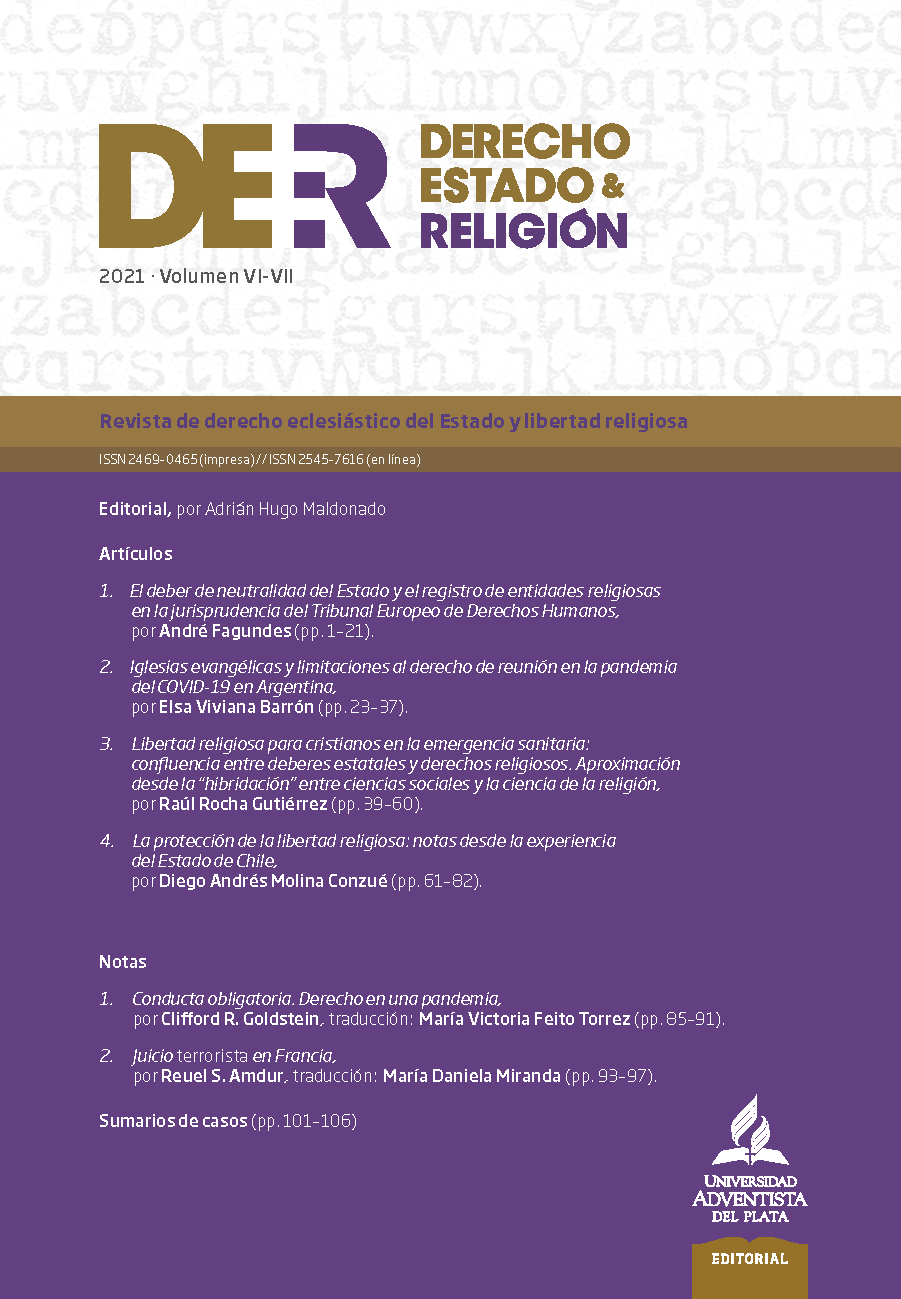Iglesias evangélicas y limitaciones al derecho de reunión en la pandemia del COVID-19 en Argentina
Keywords:
The right to meet, Evangelical churches, COVID-19Abstract
Considering the restrictions on mobility and assembly imposed by government provisions in view of the incidence of COVID-19 in Argentina, the practices of evangelical congregations and the psychosocial effects perceived by such agents are explored, understanding that they play a relevant role in the production and circulation of beliefs. Results obtained from an intentional sample of a hundred and thirty-eight church members are presented to a recent self-administered survey. The degree of adaptation found to the limitations derived from the pandemic is significant and allows us to reflect on its incidence in the maintenance of bonds of belonging and protection, anticipating a resignification of the meaning of church, as certain turn towards an interiorization of the relationship with God and a loss of the temple’s protagonism as a space for the expression of faith.References
Ulrich Beck, La sociedad del riesgo (Barcelona: Paidós, 1998).
Fernando Soriano, “En Resistencia, una de las ciudades con más contagios por coronavirus
del país, empezaron a ir a misa en auto”, Infobae, 26 de mayo de 2020.
JPE, “La original protesta de una iglesia evangélica: abrió como bar y los pastores se convirtieron en mozos”, Clarín, 12 de junio de 2020
Zicri Orellana Rojas, “La Iglesia pentecostal: comunidad de mujeres”, Revista Cultura y Religión 3, n.º 2 (2009): 118.
Pablo Semán, “De a poco mucho: las pequeñas iglesias pentecostales y el crecimiento pentecostal. Conclusiones de un estudio de caso”, Revista Cultura y Religión 4, n.º 1 (2010): 30.
John, Durston, “Capital social parte del problema, parte de la solución, su papel en la persistencia y en la superación de la pobreza en América Latina y el Caribe”. En Capital Social
y reducción de la pobreza en América Latina y el Caribe: en busca de un nuevo paradigma,
ed. por Raúl Atria y Marcelo Siles (Chile: CEPAL, 2003), 147-202.
Martha Nussbaum, Crear capacidades. Propuesta para el desarrollo humano (Barcelona: Espasa, 2012).
Amartya Sen, Desarrollo y libertad (Buenos Aires: Planeta, 2000)
El estudio fue realizado con la colaboración de estudiantes de la Tecnicatura Superior en
Teología del Seminario Internacional Teológico Bautista (A-1324).
Respuesta abierta del líder de un grupo de jóvenes.
Ibíd.
Respuesta abierta de un miembro del equipo pastoral.
Respuesta abierta de un pastor principal
Respuesta abierta de un pastor principal.
Respuesta abierta de un creyente sin roles específicos en su congregación.
Respuesta abierta de un apóstol.
Pedro Conceição, Informe de Desarrollo Humano (Nueva York: PNUD, 2019).
Downloads
Published
Issue
Section
License
Copyright (c) 2021 Derecho, Estado y Religión

This work is licensed under a Creative Commons Attribution-NonCommercial-ShareAlike 4.0 International License.
Authors who publish with this journal agree to the following terms:
a) Authors retain copyright and grant the journal right of first publication with the work simultaneously licensed under a Creative Commons Attribution License that allows others to share the work with an acknowledgement of the work's authorship and initial publication in this journal.
b) Authors are able to enter into separate, additional contractual arrangements for the non-exclusive distribution of the journal's published version of the work (e.g., post it to an institutional repository or publish it in a book), with an acknowledgement of its initial publication in this journal.


